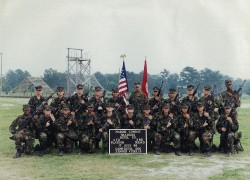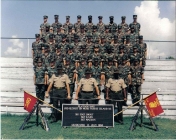Quarry Specialist s are responsible for operating electric, pneumatic, and internal combustion powered machines used in drilling, crushing, drilling, grading, and cleaning gravel and rock, or detonates explosives to blast rock in quarries and at construction sites.
21G1O - Skill Level One




Quarrying Specialist: The quarrying specialist provides mobility, counter-mobility, and survivability in support of combat forces. The quarrying specialist works as a squad, section, or platoon performing basic horizontal construction. Supervises or operates electric, pneumatic, and internal combustion powered machines used in drilling, crushing, grading, and cleaning gravel and rock, or detonates explosives to blast rock in quarries and at construction sites. Directs combat engineering missions. The quarrying specialist accomplishes these tasks while staying current in basic soldiering skills, which is necessary for today’s battlefield.
21G2O - Skill Level Two

Quarrying Specialist and Blaster: Direct the erection of rock processing equipment. Determines screen sizes and crusher settings to produce aggregate to specifications. Directs quarry rock excavation to produce required sizes and tonnage of rock. Perform duties as the primary blaster of the Quarry. Plans and Calculates required explosives for blasting.
21G3O - Skill Level Three

Quarry Foreman: Conduct and plan quarry reconnaissance and plant layout. Supervise the setup and calibration of a rock processing plant. Plans and supervises blasting operations. Supervise rock production operations. Directs combat engineering missions.
Construction Inspector: The Construction Inspector is engaged in various projects throughout the Battalion and Brigade. It includes: earthwork, reinforced and plain concrete; forms and forming; rockwork; how to take samples and make field tests; how to interpret drawings and specifications; and documentation of information pertinent to construction. The content covers the "inspector's job" including what to do and how to do it. It includes earthen structures, concrete, steel, rock, and geo-textiles.
Squad Leader: Staff Sergeants and Sergeants are normally squad leaders and are a critical link in the NCO channel. Squad leaders live and work with their soldiers every day and are responsible for their health, welfare and safety. These NCOs ensure that their soldiers meet standards in personal appearance; maintain and account for their individual and unit equipment and property. The squad leader teaches individual and collective training, develops unit cohesion, fosters the values of loyalty and commitment and builds spirit and confidence. The squad leader evaluates performance oriented training; coaching and counseling; and grooms young soldiers for future positions of increased responsibility. Squad are expected to make sound and timely decisions ranging from the amount of physical training to ethics and values. These NCOs are the basic trainer of today’s Soldiers.
Construction Inspector: The Construction Inspector is engaged in various projects throughout the Battalion and Brigade. It includes: earthwork, reinforced and plain concrete; forms and forming; rockwork; how to take samples and make field tests; how to interpret drawings and specifications; and documentation of information pertinent to construction. The content covers the "inspector's job" including what to do and how to do it. It includes earthen structures, concrete, steel, rock, and geo-textiles.
Squad Leader: Staff Sergeants and Sergeants are normally squad leaders and are a critical link in the NCO channel. Squad leaders live and work with their soldiers every day and are responsible for their health, welfare and safety. These NCOs ensure that their soldiers meet standards in personal appearance; maintain and account for their individual and unit equipment and property. The squad leader teaches individual and collective training, develops unit cohesion, fosters the values of loyalty and commitment and builds spirit and confidence. The squad leader evaluates performance oriented training; coaching and counseling; and grooms young soldiers for future positions of increased responsibility. Squad are expected to make sound and timely decisions ranging from the amount of physical training to ethics and values. These NCOs are the basic trainer of today’s Soldiers.
21G4O - Skill Level Four

Construction Inspector: The Construction Inspector is engaged in various projects throughout the Battalion and Brigade. It includes: earthwork, reinforced and plain concrete; forms and forming; rockwork; how to take samples and make field tests; how to interpret drawings and specifications; and documentation of information pertinent to construction. The content covers the "inspector's job" including what to do and how to do it. It includes earthen structures, concrete, steel, rock, and geo-textiles.
Intelligence Sergeant: The Intelligence Sergeant is responsible for the intelligence, security, operations, and training necessary to support the battalion / brigade critical wartime mission. The Intelligence Sergeant plans and supervises the security of the battalion / brigade area. The Intelligence Sergeant is responsible for the production of intelligence, and counterintelligence and intelligence training and security. It is responsible for communications, communications security, and relaying, on request, local weather observations. This section also directs activities pertaining to organization, operations, training, and deployment readiness for subordinate units.
Platoon Sergeant: The Platoon Sergeant is the primary assistant and advisor to the platoon leader, with the responsibility of training and caring for soldiers. The platoon sergeant helps the commander to train the platoon leader and in that regard has an enormous effect on how that young officer perceives NCOs for the rest of his career. The platoon sergeant takes charge of the platoon in the absence of the platoon leader. As the lowest level senior NCO involved in the company METL, platoon sergeants teach collective and individual tasks to soldiers in their squads, crews or equivalent small units.
Squad Leader: Staff Sergeants, Sergeants and Corporals are normally squad, section and team leaders and are a critical link in the NCO channel. These NCOs live and work with their soldiers every day and are responsible for their health, welfare and safety. These squad, section and team leaders ensure that their soldiers meet standards in personal appearance and teach them to maintain and account for their individual and unit equipment and property. The NCO enforces standards and develops and trains soldiers daily in MOS skills and unit missions. The NCO teaches individual and collective training, develops unit cohesion, fosters the values of loyalty and commitment and builds spirit and confidence. The NCO evaluates performance oriented training and through coaching and counseling grooms young soldiers for future positions of increased responsibility. Squad, section and team leaders teach everything from the making of sound and timely decisions to physical training to ethics and values. You, corporals and sergeants, are the basic trainer of today’s soldiers.
Intelligence Sergeant: The Intelligence Sergeant is responsible for the intelligence, security, operations, and training necessary to support the battalion / brigade critical wartime mission. The Intelligence Sergeant plans and supervises the security of the battalion / brigade area. The Intelligence Sergeant is responsible for the production of intelligence, and counterintelligence and intelligence training and security. It is responsible for communications, communications security, and relaying, on request, local weather observations. This section also directs activities pertaining to organization, operations, training, and deployment readiness for subordinate units.
Platoon Sergeant: The Platoon Sergeant is the primary assistant and advisor to the platoon leader, with the responsibility of training and caring for soldiers. The platoon sergeant helps the commander to train the platoon leader and in that regard has an enormous effect on how that young officer perceives NCOs for the rest of his career. The platoon sergeant takes charge of the platoon in the absence of the platoon leader. As the lowest level senior NCO involved in the company METL, platoon sergeants teach collective and individual tasks to soldiers in their squads, crews or equivalent small units.
Squad Leader: Staff Sergeants, Sergeants and Corporals are normally squad, section and team leaders and are a critical link in the NCO channel. These NCOs live and work with their soldiers every day and are responsible for their health, welfare and safety. These squad, section and team leaders ensure that their soldiers meet standards in personal appearance and teach them to maintain and account for their individual and unit equipment and property. The NCO enforces standards and develops and trains soldiers daily in MOS skills and unit missions. The NCO teaches individual and collective training, develops unit cohesion, fosters the values of loyalty and commitment and builds spirit and confidence. The NCO evaluates performance oriented training and through coaching and counseling grooms young soldiers for future positions of increased responsibility. Squad, section and team leaders teach everything from the making of sound and timely decisions to physical training to ethics and values. You, corporals and sergeants, are the basic trainer of today’s soldiers.
School Information
School: 807 School Location: FT LEONARD WOOD, MO
Course Title: HEAVY CONSTRUCTION EQUIPMENT OPERATOR
FY: 2008 School: 807 Course: 713-21E10 Phase: Course Length: 7 Weeks 2.0 Days
Verifiable Prerequisites
There are no Verifiable Prerequisites.
Prerequisite Courses
There are no Prerequisite Courses.
Text Prerequisites
Completion of Battle Focus Training (BFT) before awarded the MOS 21E10.
SECURITY: None
Course Scope:
21E10 POI encompasses all skill level 1 critical tasks selected for resident training as listed in STP 5-21E12-SM-TG, providing training in: 16 hours of introduction to MOS 21E10 Heavy Construction Equipment Operator Course which introduces the facility, course procedures, and criteria for successful course completion, course safety; environmental
stewardship; and The Army Maintenance Management System (TAMMS), and Accident Avoidance class. 264 hours of MOS specific training in operating a motor transport vehicle with semiautomatic transmission and lowbed trailer, a crawler tractor, a motorized scraper, a scoop loader, and a motorized grader.
Special Information:
At the completion of this Military Occupational Specialty (MOS) Advanced Individual Training (AIT) Course, Soldiers are required to attend the Battle Focused Training (BFT, course number 030-F15) at Fort Leonard Wood, MO. The course length for BFT is 8-days and reinforces the Warrior Tasks and Battle Drills.
Course Title: HEAVY CONSTRUCTION EQUIPMENT OPERATOR
FY: 2008 School: 807 Course: 713-21E10 Phase: Course Length: 7 Weeks 2.0 Days
Verifiable Prerequisites
There are no Verifiable Prerequisites.
Prerequisite Courses
There are no Prerequisite Courses.
Text Prerequisites
Completion of Battle Focus Training (BFT) before awarded the MOS 21E10.
SECURITY: None
Course Scope:
21E10 POI encompasses all skill level 1 critical tasks selected for resident training as listed in STP 5-21E12-SM-TG, providing training in: 16 hours of introduction to MOS 21E10 Heavy Construction Equipment Operator Course which introduces the facility, course procedures, and criteria for successful course completion, course safety; environmental
stewardship; and The Army Maintenance Management System (TAMMS), and Accident Avoidance class. 264 hours of MOS specific training in operating a motor transport vehicle with semiautomatic transmission and lowbed trailer, a crawler tractor, a motorized scraper, a scoop loader, and a motorized grader.
Special Information:
At the completion of this Military Occupational Specialty (MOS) Advanced Individual Training (AIT) Course, Soldiers are required to attend the Battle Focused Training (BFT, course number 030-F15) at Fort Leonard Wood, MO. The course length for BFT is 8-days and reinforces the Warrior Tasks and Battle Drills.




